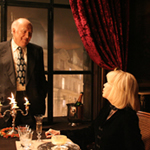Belle Toujours (Manoel de Oliveira)
The 1967 French film “Belle de Jour” was considered to be very racy at the time, starring French film superstar Catherine Deneuve as “Belle” Séverine, playing a frigid wife of a successful doctor husband. She found her only sexual release through the sadistic sexual acts she performed as a daytime-only lady of the night. The film spotlighted her character’s neurosis, which eventually led to the shooting of her husband by a jealous and similarly neurotic John, which leaves the husband as a paraplegic.
To make matters worse, a mutual friend Henri Husson (who had also told her of the brothel where she eventually became employed) felt it was his duty to expose Séverine for who she really was by telling the husband that his pristine wife was not as perfect as she appeared to be.
But we never knew what Henri really said, since that conversation was never shown in the film. And since the husband was paralyzed and not able to speak or react, viewers are left hanging.
Four decades later, director Michel Piccoli picks up where “Belle de Jour” left off with “Belle Toujours,” which promises to finally answer that nagging question, “Did he or didn’t he expose Séverine? What did he actually say or not say?”
For those that have not seen “Belle de Jour,” this film is a complete waste of time, because it doesn’t give a lot of backstory. Actually, it’s a complete waste of time even if you have seen it.
The film opens at an opera house where Henri spots Séverine in the audience, and as the opera comes to a close, she recognizes him as well and attempts to avert any reunion. This lasts through a few scenes where he sees her leaving a bar and a hotel, but his attempts are diverted each time. He finally decides to return to that bar frequently, having discussions with the bartender on duty about sexual prowess and other aspects of life, conversations that are only slightly interesting.
Then there are scenes that go on much longer than they need to, lasting for minutes on end when they should last only seconds, like the transition scene of the cityscape that should be but a moment, and then lead to something more substantial. Or a scene where we watch two butlers clearing a table from beginning to end, all of which should have ended up on the editing room floor.
Henri finally runs into Séverine on the street, but of course, they don’t play out the conversation, which I’m guessing is an attempt to peak our curiosity. It proves more annoying than anything, but it’s clear as Henri prepares his abode for Séverine that she has agreed to meet with him. Her motivation is to also find out what took place during that conversation so many years ago, but when she realizes he’s just playing games with her head, she storms out of his home.
This movie feels like you’ve been going through a maze only to end up at a dead end, and you just wish you could have the last hour and a half of your life back.



